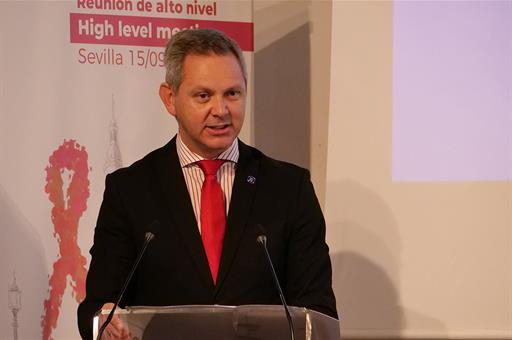Spain applies to join UNAIDS Global Alliance to end all forms of HIV-related discrimination
News - 2023.9.15
The signing took place at the Royal Alcázars in Seville, where the High Level Meeting 'HIV and Human Rights: political action to achieve zero stigma' was held as part of the events for the Spanish presidency of the Council of the European Union.
During the opening of the event, Miñones reaffirmed the Government of Spain's commitment to guarantee the rights and dignity of people living with HIV and to follow the UN mandate to end the AIDS epidemic by 2030.
"Few infectious diseases throughout history have had the levels of stigma and discrimination that have accompanied the human immunodeficiency virus," he said.
The Minister welcomed the fact that Spain is making good progress in achieving the internationally agreed objectives. In Spain today, it is estimated that 92.5% of people with HIV know their diagnosis of infection, 96.6% are receiving antiretroviral treatment and 90.4% have a suppressed viral load.
"These data bring us closer to the 95-95-95 targets set by UNAIDS, which we hope to achieve by 2025," the Minister explained.
Miñones has endorsed the Ministry of Health's commitment to protect and guarantee human rights in relation to HIV, as reflected in the Strategic Plan for the Prevention and Control of HIV Infection and Sexually Transmitted Infections 2021-2030.
In this regard, he expressed his appreciation for the work carried out by the great professionals who are striving to improve the lives of people with HIV. Among the advances, he highlighted the development of the Social Pact for non-discrimination and equal treatment associated with HIV signed in 2018 and the approval of Pre-Exposure Prophylaxis in 2019, ensuring its homogeneous implementation throughout Spain.
As a result of all this work, epidemiological indicators of HIV epidemic control have improved substantially in Spain. In addition, the Government of Spain has removed the ban on security-related positions for people with HIV or access to certain types of public employment.
Local leadership in the FAST-TRACK Cities initiative
Miñones has focused on the role of local entities to achieve full development of these strategies. In particular, he recognised Seville's leadership in providing an accelerated response to HIV, STIs and sexual health. Seville was the first Spanish city to sign up to the Paris Declaration as part of the Fast-Track Cities initiative in 2015.
Since then, 173 towns have joined the initiative in Spain, the country with the highest number of local authorities adhering to the Paris Declaration. "This leading role in the response to HIV came to fruition last October with the Seville Declaration," said Miñones, who is convinced of the need to make alliances at all levels of the administration with the aim of continuing to make Europe fairer, including in the field of health.
Non official translation





